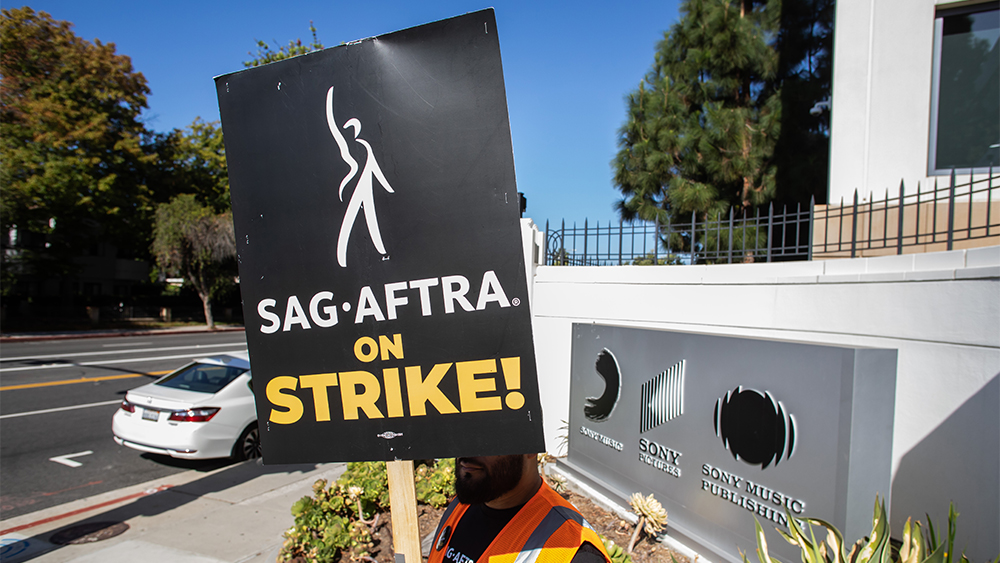SAG-AFTRA negotiators have approved a tentative agreement that will end the longest actors strike against the film and TV studios in Hollywood history.
In an announcement Wednesday, the union said the 118-day strike would officially end at 12:01 a.m. on Thursday.
The union’s negotiating committee approved the deal on a unanimous vote. The agreement next goes to the SAG-AFTRA national board for approval on Friday.
The two sides spent the last several days putting the finishing touches on the deal, which will see the first-ever protections for actors against artificial intelligence and a historic pay increase. The deal will see most minimums increase by 7% — two percent above the increases received by the Writers Guild of America and the Directors Guild of America.
The deal also includes a “streaming participation bonus,” according to an email sent to SAG-AFTRA members, as well as increases in pension and health contributions. The union said the contract is worth more than $1 billion in total.
“We have arrived at a contract that will enable SAG-AFTRA members from every category to build sustainable careers,” the union said in the email. “Many thousands of performers now and into the future will benefit from this work.”
The union is expected to hold celebrations gatherings around the country.
Kevin E. West, a member of the committee, said there were “tears of exhilaration and joy” in the committee room after the contract was approved.
“The final vote was unanimous. That’s a difficult thing to accomplish,” West said, speaking outside union headquarters. “It’s honestly been a really long two weeks.”
He said the final deal is “not perfect — nothing is,” but that getting to this outcome was an “extraordinary” achievement.
Ben Whitehair, another member of the committee, said the deal is a “massive win” for the union.
“It’s incredibly emotional,” he said. “We’ve made history.”
He said the union gained “structural change” in compensation on streaming platforms. Though the union did not get everything it wanted, he said it would be back seeking more in the next negotiation in 2026.
“When performers understand what was gained, they’re going to be thrilled,” Whitehair said.
The full details are expected to be released Friday, after the national board vote.
Sean Astin, another committee member, said it was gratifying to be able to tell a Zoom meeting full of strike captains that “their sacrifice worked.”
“People have put so much of themselves. The toll it takes is real,” he said. “The level of emotion is impossible to overstate.”
As the deal neared the finish line, AI remained one of the most complicated issues to resolve. Duncan Crabtree-Ireland, the union’s top negotiator, met with Carol Lombardini, the CEO of the Alliance of Motion Picture and Television Producers, via Zoom on Wednesday to work on the last details.
The AMPTP issued a statement Wednesday saying that the contract “represents a new paradigm.”
“The AMPTP is pleased to have reached a tentative agreement and looks forward to the industry resuming the work of telling great stories,” the employer group said.
In an appearance on CNBC earlier in the day on Wednesday, Disney CEO Bob Iger warned that the financial impact of the strike would become more severe if a deal was not reached quickly.
“Obviously we’d like to try to preserve a summer of films,” Iger said. “The entire industry is focused on that. We don’t have much time to do that.”
The AMPTP delivered its “last, best and final” offer on Friday, which included an increased bonus for actors who appear on the most-watched streaming shows. The offer did not include a key union priority — a share of revenue from each streaming platform.
SAG-AFTRA’s negotiating committee spent 12 hours on Sunday crafting its response. As of Monday, the union said that there remained differences on “several key items.” The AMPTP modified its AI language in a meeting on Monday night, leading to a 10-hour SAG-AFTRA committee meeting on Tuesday.
The committee met again for six hours on Wednesday to conclude its deliberations and take the vote.
Union members will still have to vote to ratify an agreement, a process that is likely to take at least a week or more. But the strike has already been called off, meaning that actors can return to work on Thursday.
Talks resumed on Oct. 24 after a two-week breakdown. Since then, there have been continuous negotiations as the sides inched their way toward an agreement.
Negotiations are typically left to the staff of the AMPTP, which bargains on behalf of the major studios. But four CEOs — Donna Langley of NBCUniversal, Ted Sarandos of Netflix, David Zaslav of Warner Bros. Discovery and Iger of Disney — have taken a hands-on role over the last six weeks.
The CEOs met first with the leadership of the Writers Guild of America to hammer out that agreement in late September, and then met numerous times with Fran Drescher, the president of SAG-AFTRA, and Crabtree-Ireland in an effort to end the crippling strike.
Most TV and film production has been shut down since the writers went on strike six months ago. The actors union joined them on the picket lines in mid-July, shutting down all but a relatively small number of independent film productions.
Over the last several weeks, some A-list actors have grown increasingly restless at the lack of a deal. In an interview on “CBS Mornings” on Tuesday, Tyler Perry implicitly urged the union to declare victory.
“It’s really important to know when we’ve won,” he said.
And the studios have warned that if a tentative agreement was not reached soon, the 2023-24 TV season would be lost, and next summer’s theatrical season would be crippled.
Before this year, the longest actors strike against the TV and film companies ran for 95 days in 1980. The 2023 strike eclipsed that mark on Oct. 17.
From Variety US































